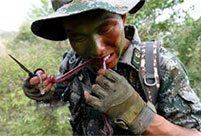

BEIJING, July 30 -- How long will healthcare companies keep bribing doctors to recommend products to patients in China?
This time, it is U.S infant formula producer Mead Johnson that committed the crime.
It has agreed to pay 12 million U.S. dollars to settle federal civil charges that its Chinese subsidiary paid hospital professionals to recommend its infant formula to new or expectant mothers, the U.S. Securities and Exchange Commission (SEC) announced earlier this week.
Mead Johnson Nutrition Co., which operates worldwide and makes Enfamil formula, neither admitted nor denied SEC findings that it violated the Foreign Corrupt Practices Act that prohibits bribery to secure business.
"We are pleased to have reached this final resolution with the SEC," Mead Johnson CEO Kasper Jakobsen said in a statement. He did not express any form of apology.
By indulging Mead Johnson, many innocent newborns' first mouth of food was kidnapped by the company. Blinded by gains, some Chinese doctors intently gave newborns its brand of milk powder, instead of discussing options including breastfeeding with new mothers without bias.
By bribing doctors, Mead Johnson monopolized the local infant formula market. The costs were transferred to Chinese consumers, mostly young families, and pushed up the price of infant formula in China, which is one of the company's most important overseas markets.
Mead Johnson owes China an apology.
An SEC investigation found the company's Chinese subsidiary paid healthcare professionals in public hospitals not only to recommend the formula but to provide the company with the contact details of patients who were new or expectant mothers for marketing purposes.
The company did not accurately records on its books the more than 2 million U.S. dollars in improper payments made between 2008 and 2013, when its business rapidly expanded in China, from 28 cities in 2008 to 241 cities in 2013. The payments, involving several of the company's foreign executives, generated nearly 8 million U.S. dollars in profits for the company, according to the SEC.
Once again, bribery has become an extremely harmful convention in China's medical sector. It is a cancer that needs to be tackled by the country's medical reform. Health authorities vowed to"seriously punish" health professionals promoting infant formula to new or expectant mothers in 2013.
They made good on that promise late last year, when the China branch of British drug maker GlaxoSmithKline (GSK) was fined 3 billion yuan (489 million U.S. dollars) for paying bribes to boost sales of its products. The fine was the biggest ever by a Chinese court. Five individuals with the firm, including a British national and former manager of GSK China, were given suspended jail sentences of between two and four years.
Mead Johnson's CEO said the company will continue to stress principles of integrity and compliance with the law "in all our interactions with customers and business partners."
Mead Johnson and GSK might be law-abiding at home, but why should they not be in China? Chinese watchdogs should keep a closer eye.
 Student proposes during graduation ceremony
Student proposes during graduation ceremony China-made special vehicles in exhibition
China-made special vehicles in exhibition Soldiers serving at Liaoning aircraft carrier
Soldiers serving at Liaoning aircraft carrier Bikini beauties lifeguards in river rafting place
Bikini beauties lifeguards in river rafting place PLA soldiers eat raw snake meat in harsh training
PLA soldiers eat raw snake meat in harsh training Kiss contest held in Nanning, SW China
Kiss contest held in Nanning, SW China Yunnan-Myanmar Road: The past and present
Yunnan-Myanmar Road: The past and present Photos of beautiful policewoman become online hit
Photos of beautiful policewoman become online hit Campus belle of Xiamen University gets popular online
Campus belle of Xiamen University gets popular online Talents return for Party
Talents return for Party Sino-Turkish ties can overcome conflicts
Sino-Turkish ties can overcome conflicts Turkish president opposes terror against China
Turkish president opposes terror against China MH370: Debris similar to lost plane found in southern Indian Ocean
MH370: Debris similar to lost plane found in southern Indian OceanDay|Week